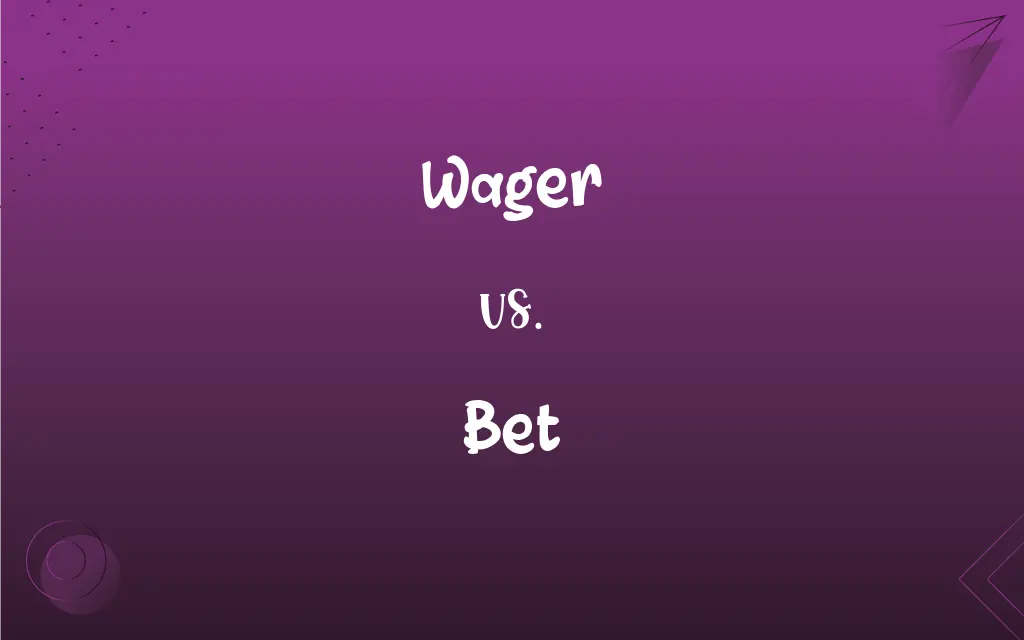Wager vs. Bet: What's the Difference?
By Harlon Moss & Janet White || Updated on March 4, 2024
A wager is a formal term for betting, involving risking money on an uncertain outcome, while a bet is the act of gambling money on a prediction about an event's result.

Key Differences
Wagers represent the broader concept of placing money or something of value on the prediction of an uncertain outcome, often associated with formal gambling contexts such as casinos or sports betting platforms. Wagers are understood as agreements between two parties where the loser must forfeit something predetermined to the winner based on the outcome of an event. Bets, on the other hand, are commonly used in informal and formal gambling contexts. They are specific instances of wagers, where individuals risk money or assets on the outcomes of various events, ranging from sports games to everyday occurrences. The term "bet" is often used in casual conversations and is seen as more colloquial.
While wagers are often associated with structured gambling environments where rules and regulations govern the terms of the gamble, bets can occur in any setting. Bets might not always follow a strict set of rules and can be made spontaneously between individuals on almost any matter of dispute or prediction.
The legal and formal implications of wagers are typically more pronounced, with contracts or agreements often outlining the terms of the wager, including the stakes and conditions. This formalization ensures clarity and fairness in the execution of the wager, especially in regulated gambling industries. Conversely, bets, while they can be formalized in the context of legal gambling, often lack detailed agreements in casual settings. The terms are usually verbally agreed upon, relying more on the honor system and personal trust between the parties involved.
Comparison Chart
Definition
Formal agreement to risk money on an uncertain outcome.
Informal or formal act of gambling money on a prediction.
Context
Often associated with formal gambling settings.
Can be made in both informal and formal contexts.
ADVERTISEMENT
Rules and Regulations
Typically governed by strict rules.
May not always follow a strict set of rules.
Personal Stakes
May involve larger, structured stakes.
Often involves personal stakes, made between individuals.
Legal Implications
Formal agreements or contracts often outline terms.
Terms are often verbally agreed upon without formal documentation.
Wager and Bet Definitions
Wager
A formal bet on an outcome involving money or valuables.
He placed a significant wager on the championship game.
Bet
Informal agreement to risk money on a prediction.
I bet $20 that it'll rain tomorrow.
ADVERTISEMENT
Wager
Often used in legal gambling contexts.
Her wager at the casino netted a substantial win.
Bet
Common in both casual and formal gambling.
He made a bet with his friend on the game's score.
Wager
Implies a formalized bet with agreed terms.
They entered into a wager over the outcome of the election.
Bet
Can occur in everyday situations.
They had a friendly bet on who could finish their work the fastest.
Wager
Associated with structured betting environments.
The wager on the horse race was made through an official bookkeeper.
Bet
Often based on personal stakes and trust.
Their bet on the trivia question added excitement to the evening.
Wager
An agreement under which each bettor pledges a certain amount to the other depending on the outcome of an unsettled matter.
Bet
Less formal than a wager, but can be part of gambling.
She placed a bet at the sportsbook on her favorite team.
Wager
A matter bet on; a gamble.
Bet
An agreement usually between two parties that the one who has made an incorrect prediction about an uncertain outcome will forfeit something stipulated to the other; a wager
Made a bet that it would stop raining before 2:00.
Wager
Something that is staked on an uncertain outcome; a bet
A wager of $20.
Bet
An amount or object risked in a wager; a stake
A bet of $50.
Wager
(Archaic) A pledge of personal combat to resolve an issue or case.
Bet
One on which a stake is or can be placed
Our team is a sure bet to win.
Wager
To risk or stake (an amount or possession) on an uncertain outcome; bet.
Bet
A plan or an option considered with regard to its probable consequence
Your best bet is to make reservations ahead of time.
Wager
To make a bet.
Bet
(Informal) A view or opinion, especially about something that cannot be known at the present time
My bet is that the rain will hold off. My bet is he didn't do it.
Wager
Something deposited, laid, or hazarded on the event of a contest or an unsettled question; a bet; a stake; a pledge.
Bet
To stake (an amount, for example) in a bet.
Wager
That on which bets are laid; the subject of a bet.
Bet
To make a bet with
I bet them that we would be first.
Wager
(legal) A contract by which two parties or more agree that a certain sum of money, or other thing, shall be paid or delivered to one of them, on the happening or not happening of an uncertain event.
Bet
To make a bet on (a contestant or an outcome).
Wager
(legal) An offer to make oath.
Bet
To maintain confidently, as if making a bet
I bet they were surprised by the news.
Wager
Agent noun of wage; one who wages.
Bet
To make or place a bet.
Wager
(transitive) To bet something; to put it up as collateral.
I'd wager my boots on it.
Bet
A wager, an agreement between two parties that a stake (usually money) will be paid by the loser to the winner (the winner being the one who correctly forecast the outcome of an event).
Dylan owes Fletcher $30 from an unsuccessful bet.
Wager
To suppose; to dare say.
I'll wager that Johnson knows something about all this.
Bet
A candidate (for elections and pageants).
Wager
Something deposited, laid, or hazarded on the event of a contest or an unsettled question; a bet; a stake; a pledge.
Besides these plates for horse races, the wagers may be as the persons please.
If any atheist can stake his soul for a wager against such an inexhaustible disproportion, let him never hereafter accuse others of credulity.
Bet
A degree of certainty.
It’s a safe bet that it will rain tomorrow.
There's a decent bet that we'll be able to reach the top of that hill in an hour.
It’s an even bet that Jim will come top of the maths test tomorrow.
There's a good bet that Sally will arrive later.
Wager
A contract by which two parties or more agree that a certain sum of money, or other thing, shall be paid or delivered to one of them, on the happening or not happening of an uncertain event.
Bet
Alternative form of beth
Wager
That on which bets are laid; the subject of a bet.
Bet
To stake or pledge upon the outcome of an event; to wager.
Wager
To hazard on the issue of a contest, or on some question that is to be decided, or on some eventuality; to lay; to stake; to bet.
And wagered with himPieces of gold 'gainst this which he wore.
Bet
To be sure of something; to be able to count on something.
Fancy going for a drink after work?
You bet I do!
You bet I do!
Wager
To make a bet; to lay a wager.
'T was merry whenYou wagered on your angling.
Bet
(poker) To place money into the pot in order to require others do the same, usually only used for the first person to place money in the pot on each round.
Wager
The act of gambling;
He did it on a bet
Bet
(knitting) between
Wager
The money risked on a gamble
Bet
That which is laid, staked, or pledged, as between two parties, upon the event of a contest or any contingent issue; the act of giving such a pledge; a wager.
Wager
Stake on the outcome of an issue;
I bet $100 on that new horse
She played all her money on the dark horse
Bet
To stake or pledge upon the event of a contingent issue; to wager.
John a Gaunt loved him well, and betted much money on his head.
I'll bet you two to one I'll make him do it.
Wager
Maintain with or as if with a bet;
I bet she will be there!
Bet
An early form of Better.
Wager
Agreement to risk something of value on an event's result.
The wager required both participants to commit $100.
Bet
The money risked on a gamble
Bet
The act of gambling;
He did it on a bet
Bet
Maintain with or as if with a bet;
I bet she will be there!
Bet
Stake on the outcome of an issue;
I bet $100 on that new horse
She played all her money on the dark horse
Bet
Have faith or confidence in;
You can count on me to help you any time
Look to your friends for support
You can bet on that!
Depend on your family in times of crisis
FAQs
What is a bet?
A bet is an informal or formal act of risking money or something of value on a prediction about the result of an event.
How do wagers and bets differ in context?
Wagers are typically associated with formal gambling environments, while bets can be made in both informal and formal settings.
Are wagers legally binding?
In regulated gambling environments, wagers can be legally binding, with formal agreements outlining the terms.
Can a bet be considered a wager?
Yes, a bet can be considered a form of wager, especially when it takes place in a formal gambling context.
What is a wager?
A wager is a formal agreement to risk money or valuables on the uncertain outcome of an event, often within a regulated gambling context.
What role do trust and honor play in betting?
In informal betting, trust and honor are crucial, as terms are often verbally agreed upon without formal documentation.
Do you need a contract for a wager?
In formal gambling settings, wagers may require contracts or official agreements, whereas casual bets do not.
Can wagers involve non-monetary items?
Yes, wagers can involve risking non-monetary items of value, not just cash.
How do odds work in wagers and bets?
Odds determine the potential return on a wager or bet, indicating the likelihood of a particular outcome. They are crucial in calculating winnings in gambling contexts.
Can you make a bet on anything?
Yes, bets can be made on virtually any event or outcome, ranging from sports to daily occurrences.
Is betting legal everywhere?
The legality of betting varies by jurisdiction, with some places having strict regulations or outright bans on certain forms of gambling.
What is responsible gambling?
Responsible gambling involves understanding the risks, knowing when to stop, and never betting more than one can afford to lose, aiming to prevent gambling addiction.
What happens if a wager or bet is disputed?
In formal settings, disputes are resolved according to the gambling establishment's rules or legal guidelines. Informally, resolution depends on the agreement between the parties.
Is it possible to cancel a wager or bet after placing it?
In formal gambling, once a wager is placed and accepted, it's usually binding. Informally, cancellation depends on the agreement between the individuals involved.
What role do bookmakers play in wagers and bets?
Bookmakers, or bookies, set odds, accept, and place bets on behalf of others, playing a central role in organized sports betting and other gambling activities.
What is a "push" in betting terms?
A "push" occurs when a bet results in a tie, and the original stake is returned to the bettor, commonly found in sports betting.
How do online platforms affect wagers and bets?
Online platforms have made it easier to place wagers and bets, offering convenience and a wide range of betting options but also raising concerns about regulation and problem gambling.
Are there limits to how much you can wager or bet?
Yes, in formal gambling settings, there are often limits set by the house or regulatory bodies. In informal bets, limits are usually agreed upon by the parties involved.
Can minors legally place wagers or bets?
Generally, minors are prohibited from engaging in gambling, including placing wagers or bets, in most jurisdictions.
Can wagers or bets be placed on non-sporting events?
Yes, wagers and bets can be placed on a wide variety of events, including elections, award shows, and reality TV outcomes, not just sports.
About Author
Written by
Harlon MossHarlon is a seasoned quality moderator and accomplished content writer for Difference Wiki. An alumnus of the prestigious University of California, he earned his degree in Computer Science. Leveraging his academic background, Harlon brings a meticulous and informed perspective to his work, ensuring content accuracy and excellence.
Co-written by
Janet WhiteJanet White has been an esteemed writer and blogger for Difference Wiki. Holding a Master's degree in Science and Medical Journalism from the prestigious Boston University, she has consistently demonstrated her expertise and passion for her field. When she's not immersed in her work, Janet relishes her time exercising, delving into a good book, and cherishing moments with friends and family.































































